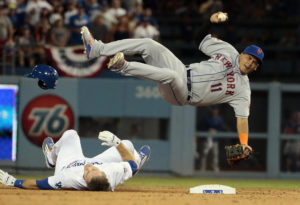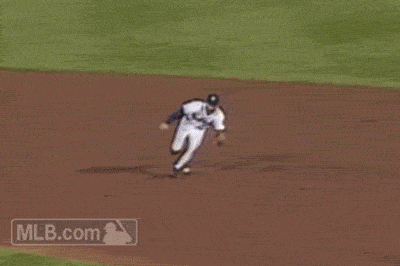
The neighborhood play was allowed to try to prevent contact like this
A neighborhood play does not have the power it once used to. Instant replay has almost eliminated the possibility of a neighborhood play, as baseball has become an honest game of inches.
What is a neighborhood play? During a double play, the fielder covering second base is allowed to be in the vicinity of the bag without actually touching it and still record the force out. This was a rule implemented for the safety of infielders, as runners would use takeout slides to break up the twin killing.
An infielder could still try to make a neighborhood play, however it is now reviewable through instant replay; if a fielder does not make contact with the base, the runner will be ruled safe. Consequently, runners must slide and be able to touch the base without over sliding the base. This tries to eliminate malicious contact from takeout slides. Contact may still be made if it occurs during the natural slide over the base.
The neighborhood play may still be effectively used in amateur and college baseball if there is no instant replay allowed. Instant replay of course requires cameras recording the field action. Lower levels of baseball have rules requiring runners to slide directly into bases, lowering the risk of collisions during double plays.

The neighborhood play can’t help if Albert Belle is coming at you
One of the more infamous plays that resulted in these rule changes occurred during the 2015 NLDS. Chase Utley plowed through Ruben Tejada and ended up breaking his leg. Utley was out on the force play, but Tejada was unable to turn the double play. Tejada might have been able to defend himself and get the force out had he not reached for the bag and turned his back to the base runner.
Replay has become a fixture in MLB that is not going anywhere. Coaches, players, and especially fans complain when an umpire gets a call wrong. Instant replay has allowed umpires to get meticulous calls correct; this includes players touching (or not touching) bases to officially record an out.
While the new slide rule was implemented to coincide with instant replay, the consequence has been the elimination of the neighborhood play. No longer are fielders getting away with not touching a base, even if for safety purposes. Rule changes rarely get overturned, and that means the neighborhood play will only be a thing of highlight reels.

Leave a Reply